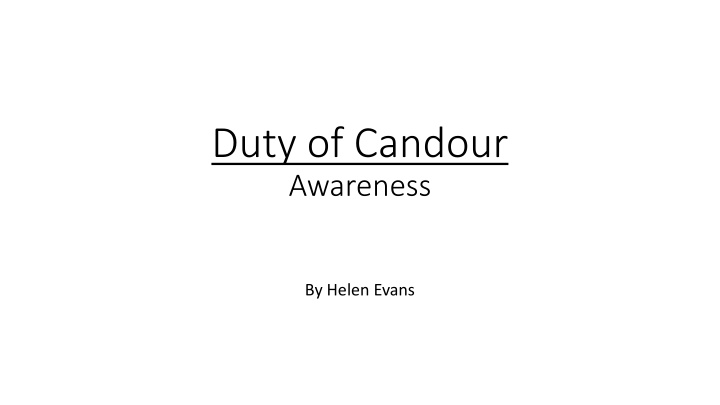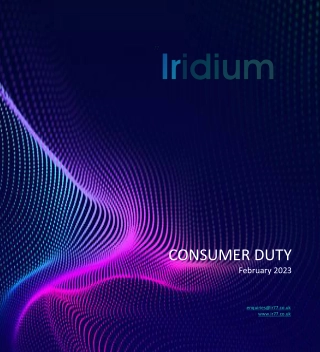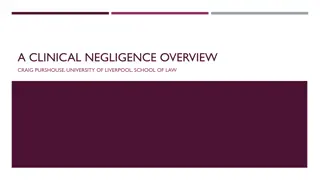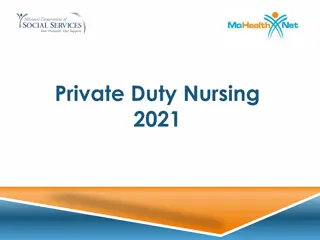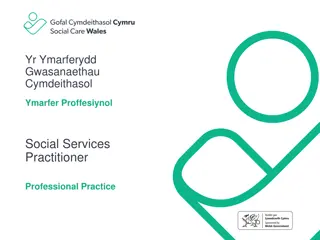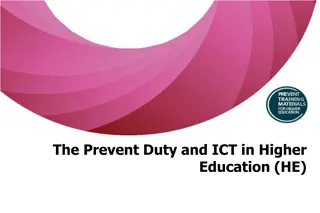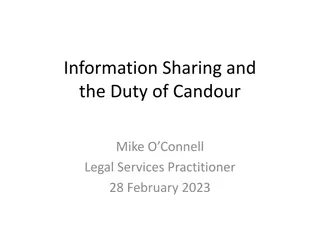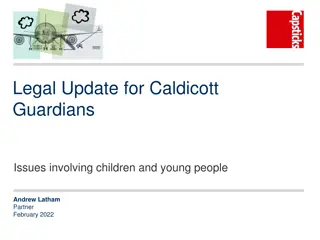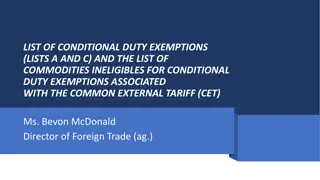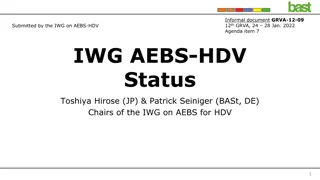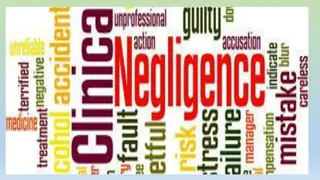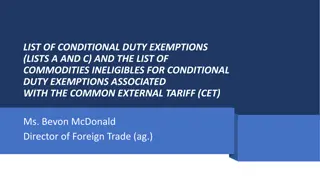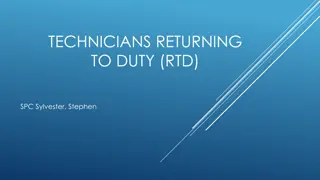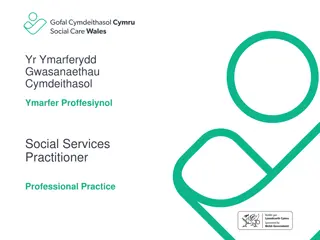Duty of Candour
Duty of Candour refers to the obligation to inform patients and families about harm or death caused by care. The CQC requires transparency, reporting of incidents, and providing support to those affected. This includes apologizing, ensuring understanding, reporting near misses, and offering emotional support.
Download Presentation

Please find below an Image/Link to download the presentation.
The content on the website is provided AS IS for your information and personal use only. It may not be sold, licensed, or shared on other websites without obtaining consent from the author.If you encounter any issues during the download, it is possible that the publisher has removed the file from their server.
You are allowed to download the files provided on this website for personal or commercial use, subject to the condition that they are used lawfully. All files are the property of their respective owners.
The content on the website is provided AS IS for your information and personal use only. It may not be sold, licensed, or shared on other websites without obtaining consent from the author.
E N D
Presentation Transcript
Duty of Candour Awareness By Helen Evans
What is Duty of Candour? Refers to the organisational and professional duty to inform a patient and, where appropriate, their family in circumstances in which moderate or severe harm or death has been caused as a direct or indirect result of the care or treatment provided or not provided. It is both a contractual duty and a legal requirement to ensure that Duty of Candour discussions are had with patients impacted by moderate or severe harm and/ or with their families, for example with the patient s consent or where the harm has led to the unexpected death of the patient. Candour is defined in Robert Francis report: The volunteering of all relevant information to persons who have or may have been harmed by the provision of services, whether or not the information has been requested and whether or not a complaint or a report about that provision has been made. Sir. Robert Francis report: full coverage of the findings from the inquiry into care failures at Mid Staffordshire Foundation Trust (published in February 2013) Prompt apologies and explanations, with a reassurance they will not reoccur, may prevent a claim being brought at all
CQC requirements Registered persons must act in an open and transparent way with relevant persons in relation to care and treatment provided to service users in carrying out a regulated activity. This means we must: Promote a positive culture for open and transparent behaviours Be aware of and have good knowledge of Policies and procedures Report Breaches of the professional duty of candour Understand individual responsibilities and supported Attend training
CQC requirements As soon as reasonably practicable after becoming aware that a notifiable safety incident has occurred a registered person must notify the relevant person that the incident has occurred This means we must do the following: 1. Provide a meaningful apology 2. Ensure the relevant person can understand (e.g. ensure and provide interpreters, advocates, or other communication aids, etc. where practicable) 3. Notify the individual who is most appropriate to provide the notification and/or apology 4. Report Near misses 5. Record all incidents and near misses 6. Where the person lacks the mental capacity; liaise with NOK
CQC requirements As soon as reasonably practicable after becoming aware that a notifiable safety incident has occurred a registered person must provide reasonable support to the relevant person in relation to the incident, to help overcome the physical, psychological and emotional impact of the incident This means we need to: 1. Provide Emotional support to the relevant person 2. Provide access to any necessary treatment to minimise the harm 3. Provide specialist independent sources if and where possible 4. Arrange for another professional if the relevant person wishes 5. Support to access the complaints
CQC requirements Providers must ensure that they give written notification to the relevant person following the notification that was given in person, even though enquiries may not yet be complete Written within 10 working days is required. But HXH aim to be done in 2 Working days
CQC requirements If the relevant person cannot be contacted in person, or declines to speak to the representative, the registered person must: 1. The provider must make every reasonable attempt. All attempts to contact the relevant person must be documented If the relevant person does not wish to communicate with the provider, this must be respected and recorded If the relevant person has died and there is nobody who can lawfully act on their behalf, a record of this should be kept 2. 3.
CQC requirements The registered provider must keep a copy of all correspondence with the relevant person.
Duty of Candour Policy Holy Cross Hospital will be open and honest with patients when things go wrong with their care and treatment. To meet the requirements of the Duty of Candour regulation, we will at all times, and in all circumstances, be open and honest with our patients and their families about the standard and quality of care we have provided. In particular, should we happen to cause harm to any patients; By failing to do something we should have, By making an error in our care or treatment We will always acknowledge and explain this fully to the patient and family at the earliest possible opportunity and provide reasonable support to the patient and family after the incident.
Chief Executive duty of candour responsibilities It is the duty of the Chief Executive to lead by example and to hold himself/herself and others to account for complying with the legal and moral duties placed on providers of health care. Specifically, role holder will: Uphold the principles of the Duty of Candour regulation and commit to being open and honest Enforce the Hospital policy on Duty of Candour and promote a culture in which openness and honesty are valued Receive assurance reports from Director of Nursing Services demonstrating that, in all applicable instances, Duty of Candour conversations have taken place and that a written summary of the conversation has also been provided to those impacted by harm Ensure the Hospital has formal arrangements in place for the implementation of Duty of Candour principles
Freedom to Speak up Guardian duty of candour responsibilities (HR Manager) Ensuring that concerns are dealt with appropriately Safeguarding the interests of the individual, ensuring there are no repercussions for them either immediately or in the longer term and that they have access to personal support as appropriate Helping to develop a culture where speaking up is recognised and valued Maintaining a position of independence and impartiality Preparing and providing regular reports of issues raised by staff, identifying key concerns and potential actions to be considered Identifying common themes and ensuring learning is shared Contributing and participating in staff training
DNS - duty of candour responsibilities Ensure that the professional standards of all reporting clinical staff are maintained, including the professional duty of candour as it applies to registered clinical professionals Ensure that an explicit procedure for the management of Duty of Candour disclosures and related actions is in place, which includes processes for the monitoring and reporting of compliance Ensure that copies of investigation findings arising from harm incidents are shared with the impacted patient and, where appropriate, with their families Ensure that appropriate Duty of Candour communication has occurred with the patient/ family at an early stage, with a written summary of the conversation provided within 2 working days
Clinical managers and leaders duty of candour responsibilities (e.g. Senior nurses) Promote and proactively encourage a team and organisational culture in which openness and honesty are valued Hold people to account in instances when they fail in their duty to identify and report patient harm Initial communication to impacted patient or family and provide basic information and guidance on the next steps
All Staff duty of candour responsibilities Be aware of, and apply the principles of the Duty of Candour policy Be vigilant in the identification of incidents causing patient harm Report incidents at the earliest opportunity to their manager
Procedure for the initiation and completion of Duty of Candour process 1. Members of the multidisciplinary team should meet as soon as reasonably practical after the identification of the event Timing the initial discussion as soon as feasibly possible Selecting the individual to communicate with patient/ family - most senior person responsible for the patient s care and experience in dealing with incidents Incident involving healthcare staff who made mistakes In cases where the healthcare professional wishes to attend in order to offer personal apology, they should be accompanied and supported by a senior colleague(s). Where there is a breach of hospital discipline, misconduct or gross misconduct, the human resource department will be involved to trigger the discipline procedure. If the patient express's a preference for the exclusion of an involved healthcare professional from the discussion, this should be honoured and the option of a written personal apology considered as an alternative Initial disclosure to the patient/ family Documentation Follow up meeting and completing the process Supporting staff 2. 3. 4. 5. 6. 7. 8.
Staff training New staff will receive induction training, which includes duty of candour policy. Senior managers/directors will receive training in Root Cause Analysis to assist in the investigation process. They will also receive training/ clinical supervision in managing difficult conversations and the requirements of the Duty of Candour to support them in handling sensitive conversations with patients and their relatives
